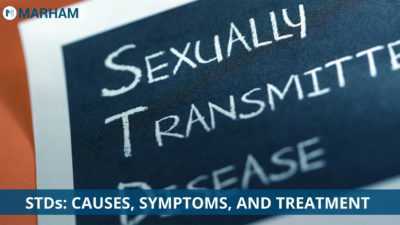According to research on STDs conducted, the incidence of STDs in Pakistan is much higher than it is believed. There is a 4.4% prevalence of STDs in males and still little to no awareness about this disease. Therefore, we have gathered all the information about sexually transmitted diseases you must know about in this health blog for you!
What are STDs?
The infections or diseases transferred from one person to another during sexual contact are known as Sexually transmitted diseases or sexually transmitted infections (STIs). Sexual contact can be of any nature, and sometimes they can even spread through intimate physical touch alone as well. STDs like herpes often spread through physical skin-to-skin contact.
“More than 1 million sexually transmitted infections (STIs) are acquired every day worldwide, the majority of which are asymptomatic” – World Health Organization (WHO)


What are the different types of STDs?
There are around 20 different types of STDs, and the most common ones include the following:
- Chlamydia
- Genital herpes
- Gonorrhoea
- HIV/AIDS
- HPV
- Pubic lice
- Syphilis
- Trichomoniasis
You can also learn more about HIV/AIDS: A Hidden Time Bomb.
What are the Common Symptoms of STDs?
Some of the symptoms you can have in this condition are:
- getting unusual discharge from your sexual body parts
- pain during urination
- lumps around the genitals
- rashes
- bleeding from genitals without any reason
- constant itching on genitals
- blisters and sores around that area
- warts around genitals or rarely inside the mouth
- pain during intercourse
What is the Cause of STDs?


STDs can be caused by parasites, bacteria and viruses. Some STIs that are caused by bacteria include Gonorrhea, syphilis and chlamydia. While HPV, genital herpes and HIV are caused by viruses.
“STIs have a direct impact on sexual and reproductive health through stigmatization, infertility, cancers and pregnancy complications and can increase the risk of HIV.” -WHO
How to Prevent getting STDs?
Some preventions you can take to avoid the risk of getting STDs include:
- Use protection during sexual intercourse
- Do not share towels or underwear with anyone
- Take a shower before and after any physical activity
- Have regular check-ups with your doctor
- Get vaccinated and have a test for HIV or hepatitis B
- Stay away from alcohol and drugs
If your doctor has asked you to get tested for HIV or hepatitis, you get up to 20% off on lab tests by booking your appointment through Marham.
What are the treatment options for STDs?


The sexually transmitted diseases caused by bacteria are usually much easier to treat. At the same time, those caused by viruses can not be cured but only treated. The treatment options for STDs include the following:
Antibiotic Treatment
Your doctor will most likely prescribe you antibiotics for sexually transmitted infections like gonorrhoea, syphilis, chlamydia and trichomoniasis. Gonorrhoea and chlamydia are usually treated together because the two infections often appear at the same time. Not getting involved in any sexual activity during your treatment is essential.
Also, read more about the 2 Ways to Identify AIDS before its too Late.
Antivirus Treatment
Antivirus treatment is usually carried out for STDs like HIV and genital herpes. It can lower your chances of transferring the disease to someone else and can be effective if started early on.
Consult a Doctor for STDs Now!
Sexually transmitted diseases are treated by medical specialists. It is best to get diagnosed with this condition as early as possible so your treatment can be effective.
Book an appointment now to answer all your queries. You can get the best advice from the Top Medical Specialists in Lahore listed on Marham.in Pakistan through Marham by calling at Marham helpline: 0311-1222398 or by online booking facility through the website or Marham mobile app.
Can’t Find The App?
Android Users:
https://play.google.com/store/apps/details?id=controllers.marham.marhammed&hl=en
Drop a review for us at the play store if you’ve had a good experience!
iPhone Users:
https://apps.apple.com/pk/app/marham-find-a-doctor/id1095243102
Stay Home. Stay Safe!
FAQs
1. Can pregnant women transfer STDs to babies?
If you are pregnant and have an STI, getting treatment right away can prevent or reduce the risk of your baby becoming infected.
2. How long can you have an STD without knowing?
The symptoms of STDs can develop in a few days, weeks or months. Getting regular check-ups is recommended if you are sexually active.
3. What age range are STDs most common?
STDs are the most common in teenagers and young adults.
4. Who is more likely to get an STD, male or female?
Females are at a higher risk of developing STDs, according to research.
5. What causes STDs in female?
Some causes of STDs in females are having unprotected intercourse, bacteria, viruses and parasites.

